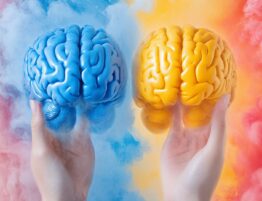Medical science continues to advance each year. It includes different areas that are responsible for different medical conditions. Neurology deserves special attention and review. It belongs to a particular branch of medicine that studies the neurological condition. Any neurological disorder can cause serious diseases that should be treated. It can start with various types of pain, cognitive impairment, and stress. Over time, this process becomes more common, and epilepsy and migraines appear. If you do not take time to take care of your health and do not see a doctor, the disease can progress. Trends in neurology allow you to consider different patient conditions. Treatment methods and modalities are based on research, analysis, and patient history. Recent times have shown that neurology continues to advance rapidly. New treatments such as neuroimaging or MRI are emerging. They are aimed at restoring the patient’s condition, evaluating and treating conditions.
New Research in Neurology: A Comprehensive Look
New research in neurology is fundamental and requires further investigation. They help us understand the topic of neurological diseases and the search for patient treatment methods. There are a large number of neurological diseases with different symptoms. Constant improvements and technological advances make it possible to better understand these diseases. This approach focuses on prescribing the right treatment plan for the patient’s data and research. These advances are crucial for treating various neurological diseases. Here are the main areas of neurological diseases that need to be addressed quickly:
- Neurodegenerative diseases. These diseases often include Alzheimer’s and Parkinson’s disease. Historically, these diseases have been difficult to treat and better treatments and prevention methods. Modern methods and new research in neurology allow us to go deeper into this issue. At the early stages, it is possible to investigate the onset of these diseases and take all possible preventive measures. Specialized diagnostics, interventions, and gene therapy are often used. They are focused on treating the patient with the opportunity to have a good life in the future. Also, researchers have developed effective medications for treatment.
- Recovery after a stroke. Stroke is a devastating condition that requires a long and regular recovery. New methods are aimed at restoring brain function after such a disease. The latest developments help to improve the intensity of the brain and its subsequent normal functioning. A variety of therapies, including magnetic stimulation and stem cell therapy, are being used. New research in neurology allows these methods to effectively cope with the disease and show excellent results. They also help to reproduce the latest treatments for human recovery and health.
- Mental disorders. Often, a person can suffer from mental disorders due to stress and daily challenges. These include schizophrenia, depression, and anxiety on a regular basis. New methods and developments help reduce the burden of such stress on the body. There are unique methods of treating depression that have a positive effect on the overall neurological state of a person. They have a positive effect on brain function and functionality and allow a person to cope with problems.
Innovations in Neurological Disease Treatment
Innovations in neurological disease treatment have become the foundation for good results. Using the latest technologies makes it possible to fully use all the possibilities for understanding the disease. New treatments are aimed at improving the patient’s condition and rehabilitation. Recently, such technologies have been progressing and gaining popularity. Here are their main types:
- Minimally invasive surgical methods. Previously, another technology was used to treat the spinal cord or brain. Surgeries were often traumatic for the patient and had negative consequences. Rehabilitation after these procedures took a long time. The development of the latest methods has minimized the risk of injury. Innovations in neurological disease treatment have made it possible to perform with less invasiveness. Now it is done by cutting small areas of human tissue. This method ensures safer procedures and faster recovery of the patient. Specially focused ultrasound is also used as an alternative. Its use is often related to the fight against Parkinson’s disease and tremors.
- Personalized medicine. For this medicine, the use of special treatment is essential. It is based on a person’s genetic makeup and is very effective. Such treatment often helps to include specific methods. It is effective for people with multiple sclerosis, gamer’s disease, and Parkinson’s disease. This development is aimed at minimizing the risks of deviations and various problems. Innovations in neurological disease treatment continue to gain momentum and improve. This approach allows us to introduce new ways of treating and preventing diseases. The introduction of immunotherapy helps to improve human health and strengthen the immune system.
Promising Directions in Neurological Research
Studying how diseases develop is a critical task. Modern methods and technologies help researchers and doctors to cope with this issue. Focusing on neuroinflammation is vital for further treatment. It affects the progression of most neurological diseases and inflammations. It is essential to understand that studying and researching this issue is critical. This raises the question of the way and method of treating patients and maintaining their health.
- Promising directions in neurological research creates new opportunities and opportunities for treatment. Neuroinflammation is a complex process characterized by immune cells activated by certain factors. These factors usually include a variety of infections, diseases, or inflammations. Over time, this action leads to damage to brain cells and disease progression. Inflammation can occur both throughout the brain and in some parts of the brain.
- The introduction of specific medications can reduce the symptoms of inflammation. They reduce inflammation in the body as a whole and support the immune system. The body is also tested for various diseases and infections. The use of non-steroidal anti-inflammatory drugs is essential for relieving symptoms and inflammation.
- Promising directions in neurological research are developing new treatments. These methods are often both preventive measures and treatment in general. The progress of various diseases and their effects on the body is stopped or slowed down. It is interesting to know that multiple sclerosis is often treated with special immunomodulatory drugs. They are aimed at stopping inflammation and slowing the progression of the disease.
Technologies in Neurology: Transforming Patient Care
Technologies in neurology are essential for treatment and success in this field. They help improve patient diagnosis and condition. It also makes it possible to treat various neurological disorders and control the entire process. It is important to understand which technologies belong to this process. Here are the main ones:
- Imaging technologies. With the help of these technologies, it has become possible to study brain function. At different stages, it is possible to investigate the appearance of various neurological diseases. This approach enables us to determine the cause of the disease and prescribe a treatment. Such technologies include MRI and MRS, which display neural circuits in the brain.
- Wearable devices. Technologies in neurology are making significant progress, and the use of special devices is critical. To track your health, it is important to have certain devices with you. Fitness trackers allow you to monitor your health. They are often aimed at monitoring a person’s heartbeat, pulse, and general condition. This data is transferred to the software, which makes it possible to monitor your condition.
- Telemedicine. The use of telemedicine has significantly reduced waiting times for both patients and doctors. It has made it possible to conduct consultations and help patients remotely. This approach is critical when there is a long distance between the patient and the doctor. Such video consultations help to keep in touch and monitor the patient’s condition.
Gene Therapy in Neurology: A Game Changer
Gene therapy in neurology offers advantages in the treatment of various neurological diseases. Typically, such therapy is aimed at correcting defective genes or replacing them. Correcting a faulty gene is essential for future treatment. Among the many clinical trials, some of them are of great importance. The use of antisense oligonucleotides is a valuable acquisition of genetic material. It is aimed at correcting and replacing a defective gene. There are a large number of neurological diseases, and some of them are associated with gene disorders. Gene therapy in neurology consists of replacing a defective gene with a healthy one. This approach allows patients to receive personalized care. The treatment is quite effective and helpful in correcting many diseases and maintaining good health.
Neuroplasticity and Its Significance in Neurological Recovery
An interesting factor is that neuroplasticity can self-repair. It does this by using neural connections in the brain to respond to certain factors. These factors usually include a variety of diseases, injuries, and even learning. Neuroplasticity and its significance are surprising because of the possibility of this recovery. Communication abilities, cognitive functions, and other benefits are restored. Neuroplasticity is an essential factor for people with neurological diseases. Often, these diseases can even include stroke and various traumatic brain injuries.
For rehabilitation, this approach is both effective and practical. During a specific trauma, the brain is damaged and impaired. Neuroplasticity affects the restoration of its cells with the possibility of further functioning. For rehabilitation, it has a crucial role at the beginning of the process. Neuroplasticity and its significance are important for any patient after certain injuries. Awareness of this issue enables us to provide various treatments and treat patients better. New treatments and personalized care are being introduced.













Please, leave your review
Write a comment: